英语教案-Haveagoodtime
初中英语《If you go to the party,you will have a good time》优质课教案、教学设计
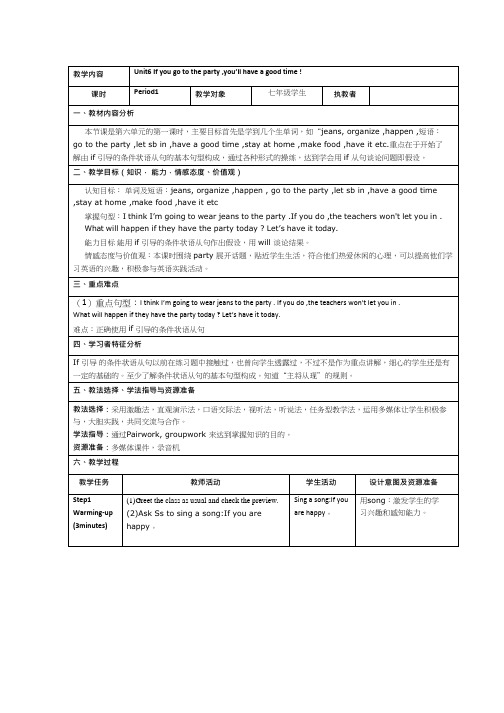
Unit6 If you go to the party ,you’ll have a good time !
课时
Period1
教学对象
七年级学生
执教者
一、教材内容分析
本节课是第六单元的第一课时,主要目标首先是学到几个生单词,如“jeans, organize ,happen ,短语:
go to the party ,let sb in ,have a good time ,stay at home ,make food ,have it etc.重点在于开始了解由if引导的条件状语从句的基本句型构成,通过各种形式的操练,达到学会用if从句谈论问题即假设。
Phrases:go to the party , let sb in , have a good time , stay at home , make food ,have it
have a good time=have fun=enjoy oneself后跟动名词形式
Stuctures:
I think I’m going to wear jeans to the party . If you do ,the teachers won't let you in .
与,大胆实践,共同交流与合作。
学法指导:通过Pairwork, groupwork来达到掌握知识的目的。
资源准备:多媒体课件,录音机
六、教学过程
教学任务
教师活动
学生活动
设计意图及资源准备
Step1 Warming-up (3minutes)
(1)Greet the class as usual and check the preview.(2)Ask Ss to sing a song:If you arehappy。
人教版八年级上册英语全册教案
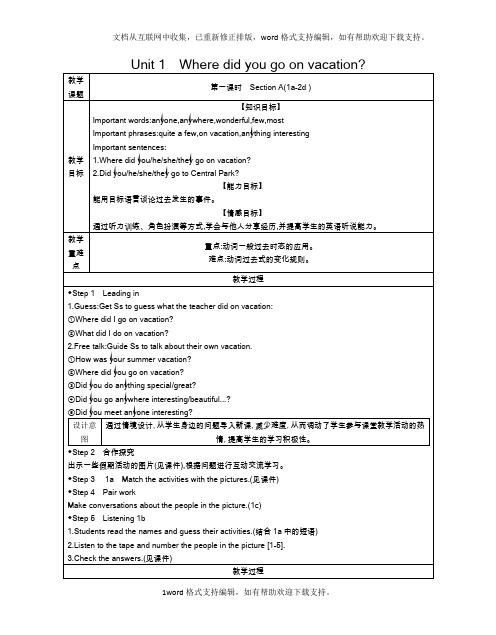
T:How was/were...?S:It was/They were...设计意图让学生做到温故知新。
◆Step 2 1a1.Look at the six pictures.2.Match the words with the pictures.3.Students complete the task in 1b individually.4.Check the answers.(见课件)◆Step 3 1bNow class,look at the words in 1a again.Which words do you think describe good things and which ones not.Let’s have a try.Try to write words on the left.Write words on the right.Check the answers.(见课件)◆Step 4 1c & 1d1.Ask students to scan the questions in 1c.2.Play the recording for the first time.And say:Listen to the tape.Lisa is talking about her plete the four questions.3.Check the answers.(见课件)4.Play the recording a second time.Students complete the task in 1d.5.Correct the answers.(见课件)◆Step 5 1eAsk 3 or 4 students to answer questions about Lisa’s vacation.You can begin your questions with:Where did...?What did...?Did she...?How was...?How were...?◆Step 6 Discussion 2aAsk the students to discuss the two questions with their partners.(见课件)◆Step 7 2bT:How about your last vacation?S:Wonderful.T:Jane went to Penang on vacation.Do you want to know something about her vacation?Scan 2b and try to answer the following two questions.(见课件)设计意图提高学生捕捉主要信息的能力。
初中英语教案模板(优秀8篇)
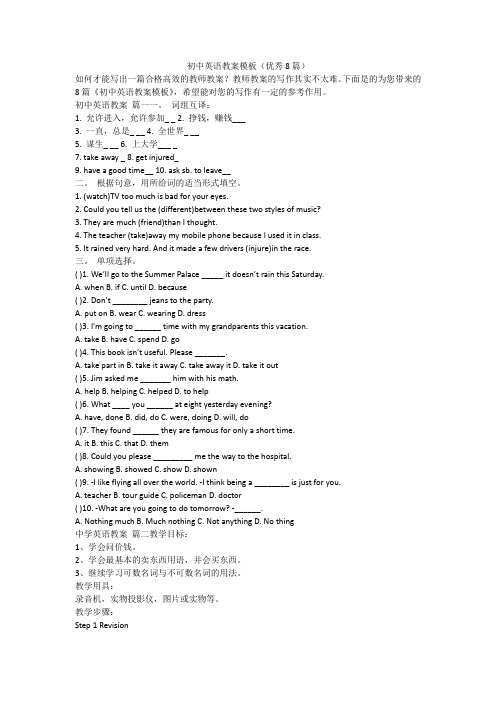
初中英语教案模板(优秀8篇)如何才能写出一篇合格高效的教师教案?教师教案的写作其实不太难。
下面是的为您带来的8篇《初中英语教案模板》,希望能对您的写作有一定的参考作用。
初中英语教案篇一一。
词组互译:1. 允许进入,允许参加_ _2. 挣钱,赚钱___3. 一直,总是_ __4. 全世界_ __5. 谋生_ __6. 上大学___ _7. take away _ 8. get injured_9. have a good time__ 10. ask sb. to leave__二。
根据句意,用所给词的适当形式填空。
1. (watch)TV too much is bad for your eyes.2. Could you tell us the (different)between these two styles of music?3. They are much (friend)than I thought.4. The teacher (take)away my mobile phone because I used it in class.5. It rained very hard. And it made a few drivers (injure)in the race.三。
单项选择。
( )1. We’ll go to the Summer Palace _____ it doesn’t rain this Saturday.A. whenB. ifC. untilD. because( )2. Don’t ________ jeans to the party.A. put onB. wearC. wearingD. dress( )3. I’m going to ______ time with my grandparents this vacation.A. takeB. haveC. spendD. go( )4. This book isn’t useful. Please _______.A. take part inB. take it awayC. take away itD. take it out( )5. Jim asked me _______ him with his math.A. helpB. helpingC. helpedD. to help( )6. What ____ you ______ at eight yesterday evening?A. have, doneB. did, doC. were, doingD. will, do( )7. They found ______ they are famous for only a short time.A. itB. thisC. thatD. them( )8. Could you please _________ me the way to the hospital.A. showingB. showedC. showD. shown( )9. -I like flying all over the world. -I think being a ________ is just for you.A. teacherB. tour guideC. policemanD. doctor( )10. -What are you going to do tomorrow? -______.A. Nothing muchB. Much nothingC. Not anythingD. No thing中学英语教案篇二教学目标:1、学会问价钱。
新人教初中英语8上Unit 10全单元教案 (5课时)

中学集体备课资料年级:八年级学科:英语课题:Unit10 If you go to the party. You will have a good time.第1课时主备人:【课题】Unit10 If you go to the party. Y ou will have a good time. 教师复备栏【学习目标】Key words and phrases: go to the party,have a good time, organize, video, Key sentences: If you go to the party, you will have a good timeIf you do,【学习重点难点】Ss master key words and sentences, then use them correctly. Ss learn to talk about consequencesSs improve their listening and speaking skills.【学法指导】Speaking and listening【教学过程】Ⅰ. Lead-inAsk some questions.T: If you are happy, what will you do?S: If I am happy, I will smile.T: If you become sad, what will you do?S: If I become sad, I will cry.T: What will happen if you are going to do too much work?S: If I am going to do too much work, I will get tired.Ⅱ. Presentation1.Show some pictures to present new structure:If it is sunny this Sunday, I’ll go fishing.Ask several students:What will you do if it is sunny this Sunday?If I have much money, I will buy a big house.What will you do if you have much money?Practice with the students:2.Show some pictures to present the following:(1) I think I’m going to stay at home.If you do, you’ll be bored.(2) I think I’m going to work until night.If you do, you’ll be tired.(3) I think I’m going to exercise.If you do, you’ll be healthy.(4) If you go to the party, you’ll have a great time.(5) If you watch TV every night, your parents will be mad at you.3. Work on 1a, match the statements with the pictures [a-d].Ⅲ. Game1. Show some pictures in the big screen. Let Ss ask and answer like this:A: What are you going to do …?B: I think I’m going to….A: If you do, you’ll be …Ⅳ. ListeningWork on 1c:1. Point out the statements and the responses in activity 1a. Tell Ss to listen to the recordings and complete the responses.2. Play the recording for the first time, Ss only listen.3. Play the recording again the try to complete the responses.4. Check the answers.Ⅴ. Pair work1. Let Ss read the model with a partner.2. Look at the pictures above. Use the information in 1b. Ask and answer with a partner.3. Let some pairs ask and answer about the pictures.Ⅵ. ListeningWork on 2a:1. Let Ss read the two sentences below. Make sure they know what to do.2. Play the recording for the Ss to listen and circle the right answers.3. Play the recording again to check the answers.Work on 2b:1. Let Ss read the phrases and questions below. Tell Ss that they should answer the questionswith the proper phrases.2. Play the recording for the Ss to write the correct answers.3. Play the recording again to check the answers.Ⅶ. Pair work1. Tell Ss role-play a conversation between Nelly and Mark.2. Give a model to the Ss.3. Ss work in pairs and practice the conversation.4. Ask so me pairs to act out their conversations.Ⅷ. Role-play1. Read the conversations and answer the questions below.(1) What will happen if we ask people to bring food?(2) What will happen if we give people some small gifts if they win?2. Explain some new words and main points in the conversation.3. Let Ss read the conversation after the teacher.4. Practice the conversation with their partner. Then let some pairs to act out theconversation.Homework:1. Recite the conversation in 2d after school.2. 用括号里所给词的适当形式补全句子。
人教版八年级英语上册Unit1 教案

人教版八年级英语上册Unit1 教案人教版八年级英语上册Unit1 教案【教案一】Section A(1a - 1c)◆学习目标1.重点短语: stay at home,go to the mountains,go to summer camp2.重点句式:—Where did Tina go on vacation ?—She went to the mountains.◆学习重点1.重点短语和句型2.一般过去时态的特殊疑问句和陈述句◆学习难点一般过去时态的特殊疑问句和陈述句◆自主学习一、认真预习1a—1c,找出下列短语和句型。
1.待在家里 ____________________2.去山区 ____________________3.去夏令营 ____________________4.去纽约城 ____________________5.—蒂娜去哪里度假了?___________________________________________________________ _____—她去山区了。
___________________________________________________________ _____________◆课堂导学Step 1情景导入Teacher:Hello,everyone.Glad to see you again.Did you have a good time during the vacation? Did you go anywhere interesting with your parents? Did you do anything special there? Can you tell us where you went on vacation ?环节说明:以学生假期旅行为话题开始本节课的教学,引起了学生的学习兴趣和用英语表达的欲望。
《Have a Good Time》英语说课PPT
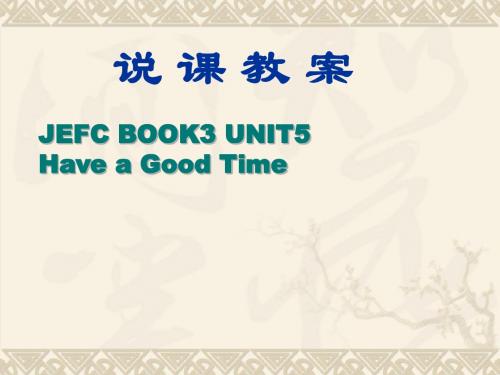
教学目标 Help students : 1. To learn new words, expressions and grammar.(知识目标) 2 . To use information technology available.
PERFORMANCE ASSESMENT FORM1
Name Initiative
Cooperation
Role
Notebook
PERFORMANCE ASSESMENT FORM2
Name Presentation (theme, content, confidence, fluency, skill, humor)
重点和难点 Employ various techniques to bridge the gap between the outside world and the students need. Help students to learn to review their experience.
The Green s Your own group
Double left click on the Internet icon
Press the enter button
Type in the website
Hainan Island
Lesson 1are to make holiday arrangements .
Lesson 19
Task 1: Students are to book tickets for the holiday. Task 2: Students are to write a travel postcard to a friend..
外研版-英语-八上-M5U1教案

M odule 5 Uni t 1教学设计教材内容课型教学方法教学目标Lis ten ing and speakingFormal and in te r ac t ive p rac t i ce,t ask-based ac t iv i t i es To unders tand the conversa t ion con tain ing in f in i t iveTo ge t spec i f i c in f ormat ion f rom the l i s t en ing mate r ia l教学重难点Did you have a good t ime?In t roduce some verbs tha t mus t be fo l l owed by in f in i t ives.教师活动1. Gree t ing Look a t some p ic tures and通过插图与词汇的引入导出情景导入相关话题,为听力对话做语言上的铺垫,在开课伊始抓住学生的注意力。
训练学生理解大意和细节辨认的能力,培养学生听大意、听细节的技巧。
知识新授2.L i s ten and choose the r igh tanswers(Act iv i ty3)2.L i s ten to the t ape andf ind ou t the r igh t a nswers1.L i s ten and read the训练学生读英语和说英语的conversa t ion.能力,以及对课文的理解能力,培养学生的口头表达能力。
情景操练2.Read the conversa t ion and answer the ques t ions(Act iv i ty4)练教师活动学生活动活动目的Show the impor tant th ings on the Reme mber the impor tan t展示本课重点内容,帮助学生blackboard th ings 加深印象。
英语微课教案5篇
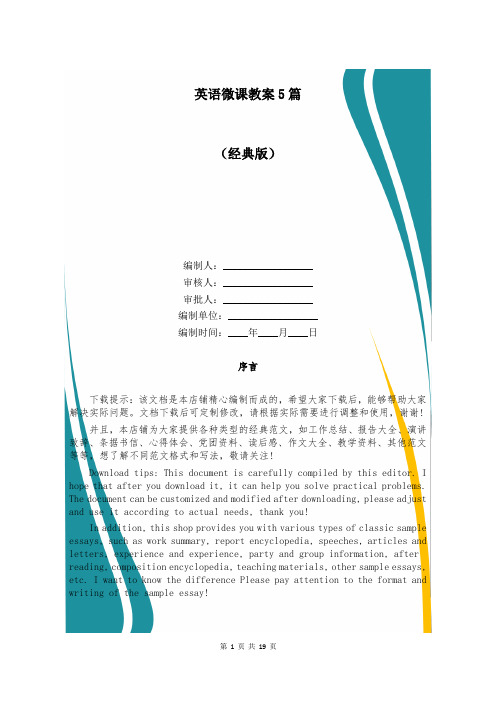
英语微课教案5篇(经典版)编制人:__________________审核人:__________________审批人:__________________编制单位:__________________编制时间:____年____月____日序言下载提示:该文档是本店铺精心编制而成的,希望大家下载后,能够帮助大家解决实际问题。
文档下载后可定制修改,请根据实际需要进行调整和使用,谢谢!并且,本店铺为大家提供各种类型的经典范文,如工作总结、报告大全、演讲致辞、条据书信、心得体会、党团资料、读后感、作文大全、教学资料、其他范文等等,想了解不同范文格式和写法,敬请关注!Download tips: This document is carefully compiled by this editor. I hope that after you download it, it can help you solve practical problems. The document can be customized and modified after downloading, please adjust and use it according to actual needs, thank you!In addition, this shop provides you with various types of classic sample essays, such as work summary, report encyclopedia, speeches, articles and letters, experience and experience, party and group information, after reading, composition encyclopedia, teaching materials, other sample essays, etc. I want to know the difference Please pay attention to the format and writing of the sample essay!英语微课教案5篇为了避免在教学过程中出错,提前制定好教案是非常重要的,一份实用的教案是需要结合实际的教学内容和教学能力的,下面是本店铺为您分享的英语微课教案5篇,感谢您的参阅。
【K12学习】英语教案-Have a good time
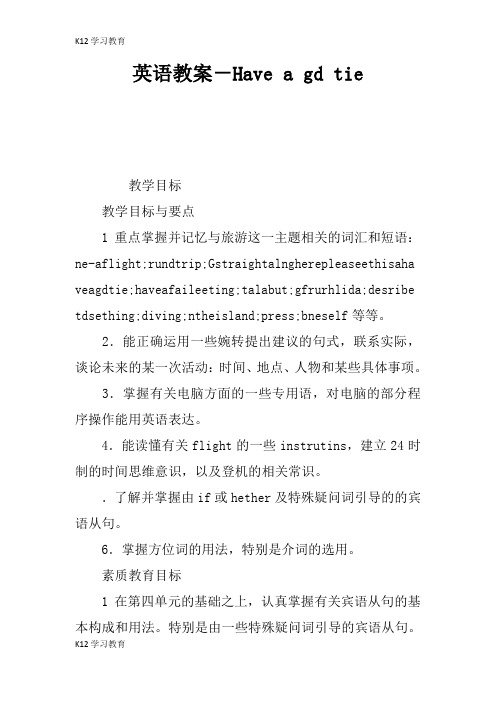
英语教案-Have a gd tie教学目标教学目标与要点1重点掌握并记忆与旅游这一主题相关的词汇和短语:ne-aflight;rundtrip;Gstraightalngherepleaseethisaha veagdtie;haveafaileeting;talabut;gfrurhlida;desribe tdsething;diving;ntheisland;press;bneself等等。
2.能正确运用一些婉转提出建议的句式,联系实际,谈论未来的某一次活动:时间、地点、人物和某些具体事项。
3.掌握有关电脑方面的一些专用语,对电脑的部分程序操作能用英语表达。
4.能读懂有关flight的一些instrutins,建立24时制的时间思维意识,以及登机的相关常识。
.了解并掌握由if或hether及特殊疑问词引导的的宾语从句。
6.掌握方位词的用法,特别是介词的选用。
素质教育目标1在第四单元的基础之上,认真掌握有关宾语从句的基本构成和用法。
特别是由一些特殊疑问词引导的宾语从句。
2鼓励学生运用所学过的句型与词组短语进行有关的日常会话。
3让学生在学习时能体会到旅游的乐趣,并且让学生知道旅游也是一种增长知识的好机会。
能够运用所学句型进行与旅行相关的准备活动,旅游信息的搜集,加工以及谈论和表达旅游过程中的感受。
4在教学过程(91aixue)中,应当调动各种教学媒体,用以加强学生对语言知识的掌握与理解。
认真引导学生运用各种学习手段进行学习,鼓励学生多方搜集与旅游有关的信息,在堂中进行英语表达,和同学之间进行信息交换等。
以提高同学们的学习兴趣和学习效果。
使部分学生能够运用所学过的与旅游主题相关的词组、短语及相关句型谈论自己的旅游经历。
教学建议本单元句型及日常交际用语一、本单元句型1Duidshaveanideas?2Ithinthatsagdidea3HabutHainanIsland?4uanditburselfHainanislandisthesendlargestislandfhina6Huhdesitsttdsething?7Thepriefatietfr…t…is…uannea8uldutellehuhitststfltHainan?9uldutelleifthereisaflightintherningnNveber,26th?10ulduteahehtsearhtheinternet?11Idlietbatiet/ar,please?12Pleasegstraightalnghere13Pleaseethisa14uldutellethatsafasttrainrnt?1Thatssundverl二、日常交际用语1.表示祝福Haveagdtie!2.有关电脑方面用语DubleleftlintheinternetinLeftlinaninterestingstrabut3.表示建议HabutHainanIsland?4表示感叹h,!/hat!hatasurprise!Hsurprising/aazing/strange!gdness!/Gdnesse!Unbelievable!/Surprising!Itsreallasurprise!Iantbelieveit/ees!Ianhardlbelieveit!ell,thatsversurprising.其他Thatsundsrealll.Ihadagreattie.教材内容分析本单元是围绕Haveagdtie这一话题,结合宾语从句展开教学活动的。
新课标英语教案案例
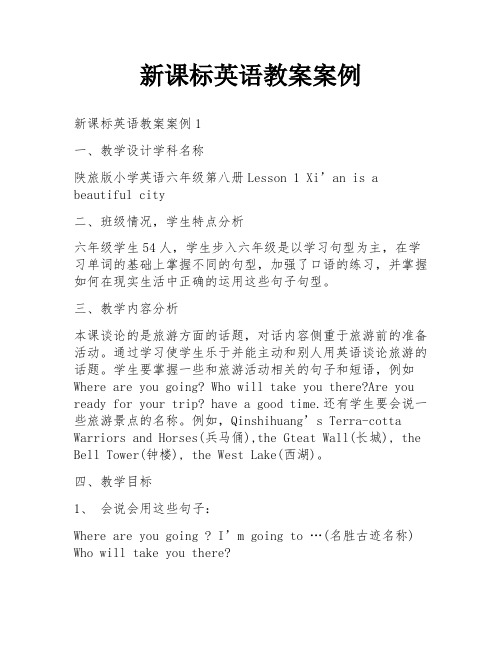
新课标英语教案案例新课标英语教案案例1一、教学设计学科名称陕旅版小学英语六年级第八册Lesson 1 Xi’an is a beautiful city二、班级情况,学生特点分析六年级学生54人,学生步入六年级是以学习句型为主,在学习单词的基础上掌握不同的句型,加强了口语的练习,并掌握如何在现实生活中正确的运用这些句子句型。
三、教学内容分析本课谈论的是旅游方面的话题,对话内容侧重于旅游前的准备活动。
通过学习使学生乐于并能主动和别人用英语谈论旅游的话题。
学生要掌握一些和旅游活动相关的句子和短语,例如Where are you going? Who will take you there?Are you ready for your trip? have a good time.还有学生要会说一些旅游景点的名称。
例如,Qinshihuang’s Terra-cotta Warriors and Horses(兵马俑),the Gteat Wall(长城), the Bell Tower(钟楼), the West Lake(西湖)。
四、教学目标1、会说会用这些句子:Where are y ou going ? I’m going to …(名胜古迹名称) Who will take you there?2、能听懂会说会用名胜古迹名称:Qin Shihuang’s Terra-cotta Warriors and Horses; The Bell Tower; the Great Wall; the Weat Lake.3、理解会用一般将来时态的两种表达法:I’m going to …I will…4、会说会用常用语:take a picture of… be ready for have a good time。
五、教学难点分析(1)学习掌握重点短语和句子,并熟悉对话。
(2)能用所学句型和别人做自由对话,并将所学内容灵活运用于实际的情境中。
(完整版)英语教案模板

临邑县中小学当堂达标教学课时教案学校月潭中学年级七年级学科英语授课人马玲班级四班时间2017 课题Module 5 Cartoon storiesUnit 1 It’s time to watch a cartoon教学目标1. 知识目标:掌握下列重点单词和词组的意思和用法: cartoon,handsome, smart, som eone, fight, humorous, hero, can’t help do ing sth. , laugh 等。
2. 能力目标:在对话中更深刻地了解三种时态的用法和区别。
3. 情感目标:能够阅读卡通故事,学会更好地理解别人,从而更懂得体谅、关爱别人。
教学重点掌握重点单词和词组的意思和用法;在对话中更深刻地了解三种时态的用法和区别。
难点了解三种时态的用法和区别。
方法小组合作法手段多媒体;小黑板板书设计Module 5 Cartoon storiesUnit 1 It’s time to watch a cartoonall the time 一直摇by the time 到……时候为止time and time again 反复for the first time 第一次from time to time 不时,偶尔once upon a time 从前have a good time 玩得高兴in time 及时on time 准时教学过程教师活动学生活动一、预习检测【自主学习】根据汉语意思完成句子1. 到了看动画片的时间了。
watch a cartoon.2. 让我们一起看《超人》吧! Superman!3. 他不断地打败坏人。
He bad people.4. 我禁不住大笑起来。
I【知识拓展】(一) It’s time to watch a cartoon. 到了看动画片的时间了。
● It’s time to do sth. 到了做某事的时间了。
相当于It’stime for sth. 。
六年级英语上册教案第三单元
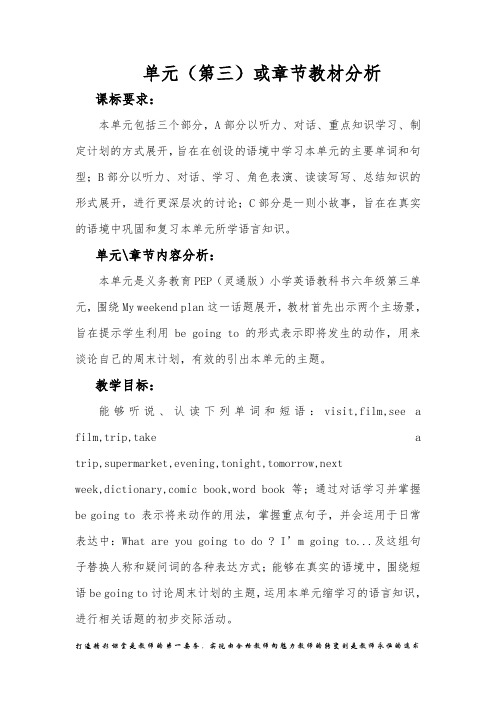
单元(第三)或章节教材分析课标要求:本单元包括三个部分,A部分以听力、对话、重点知识学习、制定计划的方式展开,旨在在创设的语境中学习本单元的主要单词和句型;B部分以听力、对话、学习、角色表演、读读写写、总结知识的形式展开,进行更深层次的讨论;C部分是一则小故事,旨在在真实的语境中巩固和复习本单元所学语言知识。
单元\章节内容分析:本单元是义务教育PEP(灵通版)小学英语教科书六年级第三单元,围绕My weekend plan这一话题展开,教材首先出示两个主场景,旨在提示学生利用be going to 的形式表示即将发生的动作,用来谈论自己的周末计划,有效的引出本单元的主题。
教学目标:能够听说、认读下列单词和短语:visit,film,see a film,trip,take a trip,supermarket,evening,tonight,tomorrow,nextweek,dictionary,comic book,word book等;通过对话学习并掌握be going to 表示将来动作的用法,掌握重点句子,并会运用于日常表达中:What are you going to do ? I’m going to...及这组句子替换人称和疑问词的各种表达方式;能够在真实的语境中,围绕短语be going to讨论周末计划的主题,运用本单元缩学习的语言知识,进行相关话题的初步交际活动。
教学重点:能够听说、认读下列单词和短语:visit,film,see a film,trip,take a trip,supermarket,evening,tonight,tomorrow,nextweek,dictionary,comic book,word book等;通过对话学习并掌握be going to 表示将来动作的用法,掌握重点句子,并会运用于日常表达中:What are you going to do ? I’m going to...及这组句子替换人称和疑问词的各种表达方式;能够在真实的语境中,围绕短语be going to讨论周末计划的主题,运用本单元缩学习的语言知识,进行相关话题的初步交际活动。
(完整版)英语教案模板

临邑县中小学当堂达标教学课时教案学校月潭中学年级七年级学科英语授课人马玲班级四班时间2017 课题Module 5 Cartoon storiesUnit 1 It’s time to watch a cartoon教学目标1. 知识目标:掌握下列重点单词和词组的意思和用法: cartoon,handsome, smart, som eone, fight, humorous, hero, can’t help do ing sth. , laugh 等。
2. 能力目标:在对话中更深刻地了解三种时态的用法和区别。
3. 情感目标:能够阅读卡通故事,学会更好地理解别人,从而更懂得体谅、关爱别人。
教学重点掌握重点单词和词组的意思和用法;在对话中更深刻地了解三种时态的用法和区别。
难点了解三种时态的用法和区别。
方法小组合作法手段多媒体;小黑板板书设计Module 5 Cartoon storiesUnit 1 It’s time to watch a cartoonall the time 一直摇by the time 到……时候为止time and time again 反复for the first time 第一次from time to time 不时,偶尔once upon a time 从前have a good time 玩得高兴in time 及时on time 准时教学过程教师活动学生活动一、预习检测【自主学习】根据汉语意思完成句子1. 到了看动画片的时间了。
watch a cartoon.2. 让我们一起看《超人》吧! Superman!3. 他不断地打败坏人。
He bad people.4. 我禁不住大笑起来。
I【知识拓展】(一) It’s time to watch a cartoon. 到了看动画片的时间了。
● It’s time to do sth. 到了做某事的时间了。
相当于It’stime for sth. 。
英语八年级上册教案(精选5篇)

英语八年级上册教案(精选5篇)八年级英语上册教案篇一一、教材分析(一)教材的地位和作用I’m more outgoing than my sister.是一篇关于用比较级来描述两个人的外貌和性格特征的阅读短文。
在前几节课中,学生学习了什么是原级,比较级。
学会了用er和more 来表达比较级,本节课通过描述一对双胞胎的外貌和性格特征的不同和相同之处来加深理解和掌握原级和比较级的运用。
同时,利用身边的人来掌握所学的句型和形容词的比较级。
把知识融合到生活中来,增强学生对学习和阅读的兴趣。
(二)教学目标的确立1、语言知识目标a.重点词汇:serious ,both , outgoing , be good at , the same as , more than , look the same , athletic.b.语法:掌握比较级er, ier, more 以及both的用法。
比较look the same , the same as和be good at的用法。
让学生能区分运用,正确掌握。
2、情感态度目标:让学生学会比较身边的事物并选择最佳方案,将之运用到生活中来。
3、学习策略目标:a.学习利用文章中的主题句快速理解文章大意;b.根据图片、上下文猜测、理解语篇中的词语和句子;二、教学环节的设计以学生阅读为主,在学生阅读过程中训练学生的阅读技巧。
以教师为辅,学生为主的教学原则,训练学生在学习中获取信息,处理信息和运用信息的能力,完成各项教学目标。
三、教学程序1、导入刚好班级有一对孪生兄弟。
把知识和实际结合起来,用所学的现有的句型来描述他们的共同和不同之处。
熟练运用形容词的原级和比较级。
用现有的人物来展示所学的知识,学生的热情和积极性很高。
2、训练与拓展Step 1、本课是一节阅读课,重点是要训练学生怎样利用主题句了解信息。
完成1—6问题。
学生快速阅读,回答根据课文设计的问题,了解学生阅读情况。
Step 2. 列出课文中的重要词组,简单讲解课文。
(初三英语教案)Have a good time
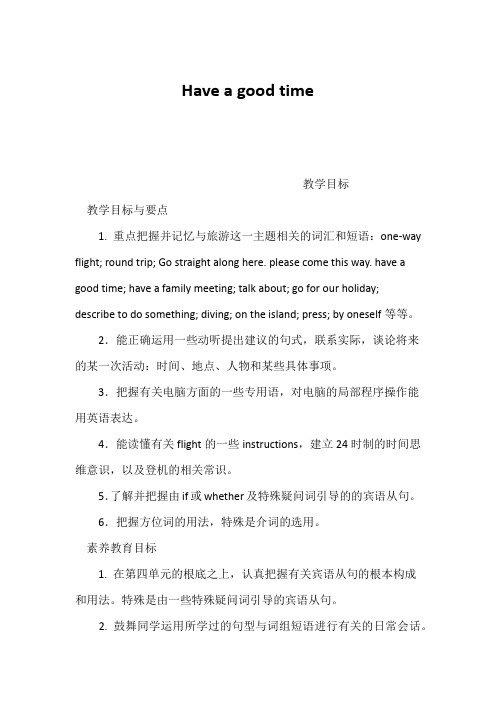
Have a good time教学目标教学目标与要点1. 重点把握并记忆与旅游这一主题相关的词汇和短语:one-way flight; round trip; Go straight along here. please come this way. have a good time; have a family meeting; talk about; go for our holiday; describe to do something; diving; on the island; press; by oneself等等。
2.能正确运用一些动听提出建议的句式,联系实际,谈论将来的某一次活动:时间、地点、人物和某些具体事项。
3.把握有关电脑方面的一些专用语,对电脑的局部程序操作能用英语表达。
4.能读懂有关flight的一些instructions,建立24时制的时间思维意识,以及登机的相关常识。
5.了解并把握由if或whether及特殊疑问词引导的的宾语从句。
6.把握方位词的用法,特殊是介词的选用。
素养教育目标1. 在第四单元的根底之上,认真把握有关宾语从句的根本构成和用法。
特殊是由一些特殊疑问词引导的宾语从句。
2. 鼓舞同学运用所学过的句型与词组短语进行有关的日常会话。
3. 让同学在学习时能体会到旅游的乐趣,并且让同学知道旅游也是一种增长学问的好时机。
能够运用所学句型进行与旅行相关的预备活动,旅游信息的搜集,加工以及谈论和表达旅游过程中的感受。
4. 在教学过程中,应当调动各种教学媒体,用以加强同学对语言学问的把握与理解。
5. 认真引导同学运用各种学习手段进行学习,鼓舞同学多方搜集与旅游有关的信息,在课堂中进行英语表达,和同学之间进行信息交换等。
以提高同学们的学习爱好和学习效果。
使局部同学能够运用所学过的与旅游主题相关的词组、短语及相关句型谈论自己的旅游经受。
教学建议本单元句型及日常交际用语一、本单元句型1. Do you kids have any ideas2. I think that's a good idea.3. How about Hainan Island4. You can do it by yourself.5. Hainan island is the second largest island of China.6. How much does it cost to do something7. The price of a ticket from … to … is …yuan one way.8. Could you tell me how much it costs to fly to Hainan9. Could you tell me if there is a flight in the morning on November,26th10. Could you teach me how to search the internet11. I'd like to book a ticket/a room, please12. Please go straight along here.13. Please come this way.14. Could you tell me that's a fast train or not15. That's sound very cool.二、日常交际用语1.表示"祝愿"Have a good time!2.有关电脑方面用语Double left click on the internet icon.Left click on any interesting story about. . ..3.表示"建议"How about Hainan Island4. 表示感慨Oh, my! /What!What a surprise!How surprising/amazing/strange!My goodness! /Goodness me!Unbelievable! /Surprising!It's really a surprise!I can't believe it/my eyes!I can hardly believe it!Well, that's very surprising.5.其他That sounds really cool.I had a great time.教材内容分析本单元是围绕"Have a good time"这一话题,结合宾语从句开放教学活动的。
【人教版】八年级英语上册 Unit 1 全单元英文教案

Unit 1Where did you go on vacation?本单元教材以Where did you go on vacation?为中心话题,围绕着描述“过去发生的事情”展开,学习和运用一般过去时态的一般疑问句Did you go/see/buy...?和特殊疑问句Where/What/How...?询问过去的事件,让学生学会谈论和分享过去发生的事件。
本课教学内容与学生的实际生活密切相关,易于引发学生运用简单的英语进行交流。
在学习活动中,学生通过交换对过去发生的事情的描述及看法,促进学生之间和师生之间的情感交流,增进情谊。
Section A的主要学习内容是:复习一般过去时态和动词的规则与不规则变化,学习一般过去时态的一般疑问句:Did you...?及不定代词的用法。
Section B安排了许多听、说、读、写的任务活动,教师在教学中可以灵活运用这些活动,将其中的一些活动进行变化或整合,充分调动学生参与的积极性,提高学生的听说读写能力。
第一课时Section A(1a-2d)Teaching Goals【教学目标】Key words & phrases:anyone,anywhere,wond erful,few,most,quite a few,go on vacationKey sentences:1.Where did you go on vacat ion?I went to the mountains/New York Cit y/summer camp/the beach.2.Did you...?Yes,I did./No,I didn't.T eaching Key Points【教学重点】The vocabulary:New York City,Central Park,few,most,quite a few,on vacationTarget language:Where did you/they/he/she go on vacation?I/They/He/She went to the mountains/New York City/summer camp/the beach. Did you...?Yes,I did./No,I didn't.Teaching Difficult Points【教学难点】Use the target language above to talk about past events.Teaching Aids【教学工具】An English textbook,a tape recorder,CAI or courseware.Teaching Steps【教学过程】★Step 1Leading inGreet the class and introduce what to learn in this period.Teacher:Welcome back to school!Did everyone have a good time during the summer vacation?Today we'll begin to learn the topic where you went on vacation.Teacher:Where did you go on vacation?Students:______.①I went to the mountains.②I visited museums.…★Step 2Pre-taskPage 1,1a & 1b.1.Look at the picture.2.Match each activity.3.Check the answers in 1b.4.Practice reading.Page 1,1c.1.Focus on the conversation in the box.2.Practice reading.3.Pairwork:Where did you go on vacation?I...4.Groupwork:Divide the class into groups of four or five. Make conversations.First S1 to S2:S1:Where did you go on vacation?S2:I...S1:Where did she/he go on vacation?S2:She/He...★Step 3While-taskPage 2,2a & 2b.1.Play the recording for the first time. Students complete the chart in 2a.2.Check the answers.(Point to one student who raises his or her hand.)3.Play the recording a second time and say:There are three conversations. The people talk about where they went on vacation. Listen to the recording and check(√)Yes,I did or No,I didn't for each question.4.Correct the answers.★Step 4Post-taskPage 2,2c & 2d.1.Focus on the conversation in 2c & 2d.2.Practice reading. Make students scan the conversations first.3.Teach and then make students role-play the conversation in pairs.4.Have a group of students present their conversation to the class.★Step 5Homework1.Practice the conversation on Page 2,2d.2.Do the exercises on Page 1 in students' book.Board Design板书设计Unit 1Where did you go on vacation?The first period Section A(1a-2d)1.Key vocabulary:anyone,anywhere,wonderful,quite a few,go on vacation 2.Target language:A:Where did Tina go on vacation?B:She went to the mountains.第二课时Section A(GF-3c)Teaching Goals【教学目标】Key words:something,nothing,everyone,myself,yourself,someone,seem,bored,diary Key phrases:go out,have a good time,of course,keep a diaryKey sentences:1.Where did you go on vacation?I went to New York City.2.Did you go out with anyone?Did you buy anything special?3.How was the food?How was your vacation?Teaching Key Points【教学重点】The vocabulary:something,nothing,everyone,myself,yourself,someone,seem,bored,diary,go out,have a good time,of course,keep a diary,on vacationTarget language:How was the food?Everything tasted really good!Did you go shopping?Of course!Did everyone have a good time?Oh,yes. Everything was excellent.Teaching Difficult Points【教学难点】e the target language above to talk about past events.2.The usage of someone,anyone,everyone,no one,something,anything,everything,nothing.Teaching Aids【教学工具】An English textbook,CAI or courseware.Teaching Steps【教学过程】★Step 1Leading in(T—teacher S—student)T:Where did you go last weekend?S:I went to the beach.T:Did you go there with anyone?S:Yes. I went to the beach with my brother.T:Did you have a good time there?S:...★Step 2Pre-taskPage 3,Grammar Focus.1.Review the grammar box. Work in pairs. One asks and the other answers.2.Practice reading the sentences in the chart.★Step 3While-taskPage 3,3a & 3b.1.Teach these new words:anyone,something,anything,everything,nothing,everyone,no one.2.Call students' attention to the conversation in 3a. Make students complete it individually.3.Choose a student to give his or her answers. Write the answers on the board.4.Correct the answers.5.Lead students to read this conversation.6.Have students work in pairs and role-play the conversation. As they talk,move around the classroom monitoring their work. Offer language or pronunciation support as needed.7.Make students complete the blanks in the e-mail message in 3b with the words in the box.8.Check the answers and then make students practice reading it.★Step 4Post-taskPage 3,3c.Complete the task in 3c.Ask your group questions about their last vacation. Then tell the class your results.★Step 5Homework1.Review the indefinite pronouns learned in this period.2.Do the exercises on Page 2 in students' book.Board Design板书设计Unit 1Where did you go on vacation?The second period Section A(GF-3c)1.The vocabulary:something,nothing,everyone,someone,myself,yourself,go out,of course2.Target language:①A:Where did you go on vacation?B:I went to New York City.②A:Did you buy anything spec ial?B:Yes,I bought something for my father.3.Structure:something special4.Answers to 3a and 3b.第三课时Section B(1a-1e)Teaching Goals【教学目标】Key words:delicious,exciting,terrible,expensive,cheap,boringKey sentences:1.Where did Lisa go on vacation?2.Did she do anything special there?Did she buy anything for her best friend?Did Lisa like her vacation?3.How was/were...?Teaching Key Points【教学重点】The vocabulary:delicious,exciting,terrible,expensive,cheap,boringTarget language:Where did Lisa go on vacation?Did she do anything special there?Did she buy anything for her best friend?How was/were...?Teaching Difficult Points【教学难点】1.询问去过何地以及感受(评价)Where did you go?I went to the beaches. How was it?It was exciting.2.Use the target language to talk about your past events.Teaching Aids【教学工具】An English textbook,a tape recorder,CAI or courseware.Teaching Steps【教学过程】★Step 1Leading in1.Greetings.2.T:Where did you go on vacation?S:I went to summer camp.T:Did you do anything special there?S:Yes,I...T:Did you buy anything for your parents or friends?S:Yes,I bought...for.../No,I bought nothing.T:How was/were...?S:It was/They were...★Step 2Pre-taskPage 4,1a & 1b.1.Look at the six pictures.2.Match the words with the pictures.3.Students complete the task in 1b individually.4.Check the answers.★Step 3While-taskPage 4,1c & 1d.1.Make students scan the questions in 1c.2.Play the recording for the first time. And say:Listen to the tape. Lisa is talking about her vacation. Complete the four questions.3.Play the recording a second time. Students complete the task in 1d.4.Correct the answers.★Step 4Post-taskPage 4,1e.Ask 3 or 4 students to answer questions about Lisa's vacation. You can begin your questions with:Where did...?What did...?Did she...?How was...?How were...?★Step 5Homework1.Review these sentences:Where did...?Did...?How was/were...?2.Do the exercises on Page 3 in students' book.Board Design板书设计Unit 1Where did you go on vacation?The third period Section B(1a-1e)1.Words:delicious,exciting,terrible,expensive,cheap,boring2.Sentences:①Where did Lisa go on vacation?②Did she buy anything special?③Did she buy anything for her best friend?④Did Lisa like her vacation?3.Answers to Activity 1a:1—5 f a c e b dAnswers to Activity 1b:wordsdeliciousexcitingcheapwordsterribleexpensiveboring第四课时Section B(2a-2e)Teaching Goals【教学目标】Key words:activity,decide,try,bird,bicycle,building,trader,wonder,difference,top,wait,umbrella,wet,below,enough,hungry,asKey phrases:feel like,because of,go to the beach,a lot of,a little,take the train,too many,what aboutKey sentences:1.I wonder what life was like here in the past.2.What a difference a day makes!3.We waited over an hour for the train because there were too many people.Teaching Key Points【教学重点】Learn Jane's diary entries about her vacation.1.The vocabulary:activity,decide,try,wonder,difference,wait,below,enough,hungry,as,feel like,because of2.Target language:I wonder what life was like here in the past. We waited over an hour for the train because there were too ma ny people.Teaching Difficult Points【教学难点】1.because and because of2.What a difference a day makes!3.Learn to write a diary.Teaching Aids【教学工具】An English textbook,CAI or courseware.Teaching Steps【教学过程】★Step 1Leading in1.Greetings.2.Introduce what to learn in this perio d,especially the articles in 2b,Jane's diary entries. Teacher begins like this:Today we'll focus on two diary entries about Jane's vacation. Through the learning you'll know how to write a diary. Let's begin now.★Step 2Pre-taskPage 5,2a & 2b.1.Review and discuss the questions in 2a box with your partner.2.Project these new words on the screen or write them on the board and teach the new words. Ask students to repeat them. And make sure everyone knows the meanings.activity n.活动;decide v.决定;try v. & n.尝试,设法;wonder v.想知道;difference n.差异;top n.顶部;wait v. & n.等待;umbrella n.伞;below prep. & adv.在……下面;enough adj.充足的;hungry adj.饥饿的3.Make students scan the articles first. Ask students to put a mark in contents that are unfamiliar to them. Then the teacher lead students to learn these two articles sentence by sentence. Pay attention to these points:(1)decide v.决定;decide to do sth.决定做某事;(2)try v.尝试;try doing sth.尝试做某事;try to do sth.尽力做某事;(3)below prep. & adv.在……下面;(4)feel like 给……的感觉;(5)because and because of;(6)wonder v.想知道4.Practice reading.★Step 3While-taskPage 6,2c & 2d.1.Make students read Jane's diary entries again. Fill in the chart in 2c.2.Students complete the conversation in 2d using the information in Jane's dairy entries.3.Choose 3 or 4 students to give their answers.4.Correct the answers.5.Have students work in pairs. Student A will be Anna and student B will be Jane. Act the conversation out.★Step 4Post-taskPage 6,2e.1.Ma ke students complete the blanks in 2e.2.Ask one student to write his or her answers on the board.3.Check the answers together with the class.4.Practice reading.★Step 5Homework1.Write a diary.2.Do the exercises on Page 4 in students' book.Board Design板书设计Unit 1Where did you go on vacation?The fourth period Section B(2a—2e)1.Key vocabulary:decide,try,wonder,difference,top,wait,below,enough,hungry,as,feel like,because of,too many2.Sentences:①I wonder what life was like here i n the past.②And because of the bad weather,we couldn't see anything below.第五课时Section B(3a-Self Check)Teaching Goals 【教学目标】Key words & phrases :duck ,dislike ,take photos ,Tian'anmen Square ,the Palace Museum ,bring back ,shopping center ,have a fun time ,school trip ,come upKey sentences :1.How did you feel about the trip?2.It was so beautiful tha t we forgot about the last five hours!Teaching Key Points 【教学重点】The vocabulary :dislike ,take photos ,Tian'anmen Square ,the Palace MuseumTarget language :What did you like best ?Did you dislike anything ?How did you feel about the trip?Teaching Difficult Points【教学难点】Write a travel diary.Teaching Aids 【教学工具】An English textbook ,CAI or courseware.Teaching Steps 【教学过程】★Step 1 Leading in1.Greetings.2.T :Beijing is the capital of our country. It's famous for its long history and places of interest ,such as Tian'anmen Square ,the Palace Museum ,the Summer Palace and so on. And Beijing duck is very delicious. Have you ever been to Beijing ?Tell your travel to us.★Step 2 Pre -taskPage 7,3a.1.Look at the three pictures.2.Use the words and phrases in the box to complete the blanks in the article.3.Check the answers.★Step 3 While -taskPage 8,Self Check.Complete the tasks in Self Check.1.Have students complete the task of Part 1.Then Choose 2 or 3 students to give their answers. Check the answers.2.Induct students to complete the passage of Part 2.Check the answers.3.Practice reading.★Step 4 Post -taskPage 7,3b & 3c.1.Make students answer the questions in 3b and take notes.2.Teach students how to write a travel diary.3.Students write a travel diary like Jane's on Page 5 using the notes in 3b.4.Choose 2 or 3 students' diaries. Make students read them out. Point out the weakness and induct the students to correct their diaries.★Step 5 Homework1.Write a travel diary.2.Do the exercises on Page 5 in students' book.Board Design 板书设计Unit 1 Whe re did you go on vacation?The fifth period Section B(3a -Self Check)1.Key vocabulary :dislike ,Tian'anmen Square ,the Palace Museum ,have a fun time ,come up2.Sentences :①Did you dislike anything?②How did you feel about the trip?③My legs were so tired that I wanted to stop.。
8年级英语教案(优秀7篇)
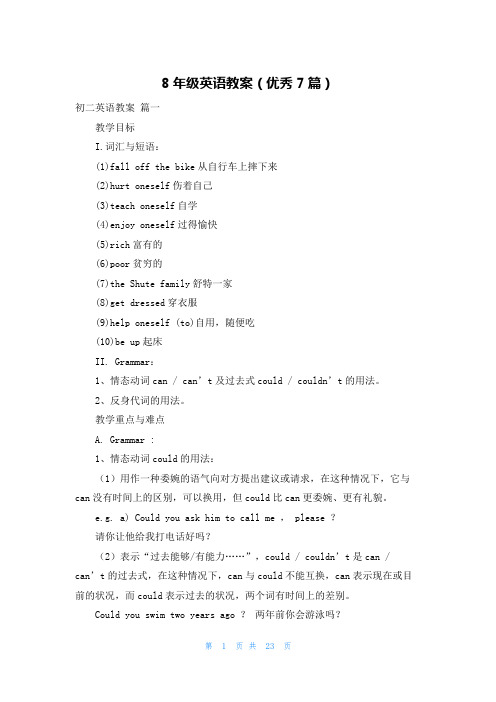
8年级英语教案(优秀7篇)初二英语教案篇一教学目标I.词汇与短语:(1)fall off the bike从自行车上摔下来(2)hurt oneself伤着自己(3)teach oneself自学(4)enjoy oneself过得愉快(5)rich富有的(6)poor贫穷的(7)the Shute family舒特一家(8)get dressed穿衣服(9)help oneself (to)自用,随便吃(10)be up起床II. Grammar:1、情态动词can / can’t及过去式could / couldn’t的用法。
2、反身代词的用法。
教学重点与难点A. Grammar :1、情态动词could的用法:(1)用作一种委婉的语气向对方提出建议或请求,在这种情况下,它与can没有时间上的区别,可以换用,但could比can更委婉、更有礼貌。
e.g. a) Could you ask him to call me , please ?请你让他给我打电话好吗?(2)表示“过去能够/有能力……”,could / couldn’t是can / can’t的过去式,在这种情况下,can与could不能互换,can表示现在或目前的状况,而could表示过去的状况,两个词有时间上的差别。
Could you swim two years ago ?两年前你会游泳吗?No ,I couldn’t 。
不,我不会。
2、反身代词:(1)形式:单数myself yourself himself herself itself复数ourselves yourselves themselves(2)一般情况下,当句子的主语和宾语是同一个人时,我们常用反身代词作宾语。
有些词与反身代词构成了固定搭配:① (all) by oneself 独自,靠某人自己。
例如:She can do it all by herself 。
- 1、下载文档前请自行甄别文档内容的完整性,平台不提供额外的编辑、内容补充、找答案等附加服务。
- 2、"仅部分预览"的文档,不可在线预览部分如存在完整性等问题,可反馈申请退款(可完整预览的文档不适用该条件!)。
- 3、如文档侵犯您的权益,请联系客服反馈,我们会尽快为您处理(人工客服工作时间:9:00-18:30)。
英语教案-Haveagoodtime 教学目标教学目标与要点1。
重点掌握并记忆与旅游这一主题相关的词汇和短语:one-way flight; round trip; Go straight along here。
please come this way。
have a good time; have a family meeting; talk about; go for our holiday; describe to do something; diving; on the island; press; by oneself 等等。
2.能正确运用一些婉转提出建议的句式,联系实际,谈论未来的某一次活动:时间、地点、人物和某些具体事项。
3.掌握有关电脑方面的一些专用语,对电脑的部分程序操作能用英语表达。
4.能读懂有关flight的一些instructions,建立24时制的时间思维意识,以及登机的相关常识。
5.了解并掌握由if或whether及特殊疑问词引导的的宾语从句。
6.掌握方位词的用法,特别是介词的选用。
素质教育目标1。
在第四单元的基础之上,认真掌握有关宾语从句的基本构成和用法。
特别是由一些特殊疑问词引导的宾语从句。
2。
鼓励学生运用所学过的句型与词组短语进行有关的日常会话。
3。
让学生在学习时能体会到旅游的乐趣,并且让学生知道旅游也是一种增长知识的好机会。
能够运用所学句型进行与旅行相关的准备活动,旅游信息的搜集,加工以及谈论和表达旅游过程当中的感受。
4。
在教学过程中,应当调动各种教学媒体,用以加强学生对语言知识的掌握与理解。
5。
认真引导学生运用各种学习手段进行学习,鼓励学生多方搜集与旅游有关的信息,在课堂中进行英语表达,和同学之间进行信息交换等。
以提高同学们的学习兴趣和学习效果。
使部分学生能够运用所学过的与旅游主题相关的词组、短语及相关句型谈论自己的旅游经历。
教学建议本单元句型及日常交际用语一、本单元句型1。
Do you kids have any ideas?2。
I think thats a good idea。
3。
How about Hainan Island?4。
You can do it by yourself。
5。
Hainan island is the second largest island of China。
6。
How much does it cost to do something?7。
The price of a ticket from … to … is …yuan one way。
8。
Could you tell me how much it costs to fly to Hainan?9。
Could you tell me if there is a flight in the morning on November, 26th?10。
Could you teach me how to search the internet?11。
Id like to book a ticket/a room, please?12。
Please go straight along here。
13。
Please come this way。
14。
Could you tell me thats a fast train or not?15。
Thats sound very cool。
二、日常交际用语1.表示祝福Have a good time!2.有关电脑方面用语Double left click on the internet icon。
Left click on any interesting story about。
3.表示建议How about Hainan Island?4。
表示感叹Oh, my! /What!What a surprise!How surprising/amazing/strange!My goodness! /Goodness me!Unbelievable! /Surprising!Its really a surprise!I cant believe it/my eyes!I can hardly believe it!Well, thats very surprising。
5.其他That sounds really cool.I had a great time.教材内容分析本单元是围绕Have a good time这一话题,结合宾语从句展开教学活动的。
以准备旅游,开始旅游,谈论旅游,以旅游为核心主题,集中呈现一系列与旅游相关的词组短语和句型。
学习了婉转提出建议的表达方式及请求和说明的日常交际用语。
要求掌握电脑方面的一些用语,对电脑的部分程序操作能用英语进行表达。
能读懂有关flight的一些instructions,建立 24时制的时间思维方式,以及登机的有关常识。
讲述了以特殊疑问词引导的宾语从句,要求学生在交谈的过程当中,在交际的语境中了解并掌握有关以疑问代词或疑问副词所引导的宾语从句。
如:Could you tell me if/whether there is a flight+时间?本单元的内容与我们生活密切相关,应认真学习,掌握一些日常用语和常用词汇及相关常识,为我们日后的travel or trip作好准备。
本单元重点难点分析1。
David and Joy, come on, were having a family meeting。
大卫、乔伊,快点,我们要开家庭会。
come on在此表示鼓励、挑战、恳求、要求等感叹语,可译作赶快;来吧;快点。
例如:(1)Come on, try it again! 来吧,再试一下!(2)Come on。
We are waiting for you。
快点,我们在等你呢。
(3)Come on。
The film has begun.赶快,电影开始了。
2。
Could you please tell me where we show our tickets?你能告诉我们在哪里检票吗?Could you。
?句型中,Could不是过去形式,在此表示语气婉转、有礼貌。
在希望得到肯定答复的疑问句中,以及在含有表示建议、请求和征求意见语气的疑问句中,常用some和something,而不用any和anything。
(1)Could you lend me your bike, please?请把你的自行车借给我好吗?(2)Would you like to have some drink?你们想喝点什么吗?(3)What about saying something about your family?说说你家庭的情况好吗?(4)Will you please give the poor boy something to eat?请给那可怜的孩子一些吃的东西好吗?3.Could you tell us how long were going to be away?你能告诉我们要去多久吗?此句是由连接副词how long引导的宾语从句。
要注意的是在以连接代词或连接副词引导的宾语从句中,从句的语序要用陈述句的语序。
从句的时态要随主句的时态而变化。
例如:(1)Do you know what time the train leaves? 你知道火车几点离开吗?(2)No one knows why he was late last night.没人知道他昨天晚上为什么迟到了。
(3)I want to know how many English words you have learned.我想知道你们已经学了多少英语单词了。
(4)She asked how much it cost.她问它值多少钱。
4。
Whats the number of the Smiths flight out of Beijing?史密斯全家离开北京的飞机航班号是什么?(1)flight是fly的名词形式,表示飞行;航班等。
例:Flight Number 6141 to Beijing is ready to leave。
去北京的6141次航班马上就要起飞了。
(2)out of从……出来(去),相对的词为into。
如:come out of the room 从房间里出来。
go into the room 到房间里去。
5。
take, spend,pay, cost四个单词意思均为花费,使用。
take常用于It takes(took,will take)sb sometime to do sth;spend构成的句式中,一般以人做主语,句型为:spend…on sth或者spend… (in)doing sth;pay构成的句式中,一般以人作主语,常用句型为 pay sb for sth 为……付款给……,pay off…付完,偿清……;cost一般以物做主语,可以解释为花费;价值,它还可做名词,意思是价值,价格。
It took my uncle less than two weeks to plant the trees。
But its worthwhile。
You see, we paid nothing for all these trees, though they cost us more time and more energy。
We spent almost 10 days last month searching everywhere, hunting for a farmer who is willing to offer us free supplies of young trees。
6.Then there are long white beaches to walk along。
along在这里是个副词,表示向前的意思。
along作副词时,其前面的动词经常用的有:come, go, crawl, walk,drive, float, fly, move, hurry, pass, roll, run,swim等。
例如:Move along, please.请向前走!Now, go along。
请直走!Pass the note along.把条子传过去。
She walked along by himself.她一个人向前走。
The days glide swiftly along.岁月如梭。
Come along! 跟我来!along 除表示上述意义之外,还可以作沿着。
